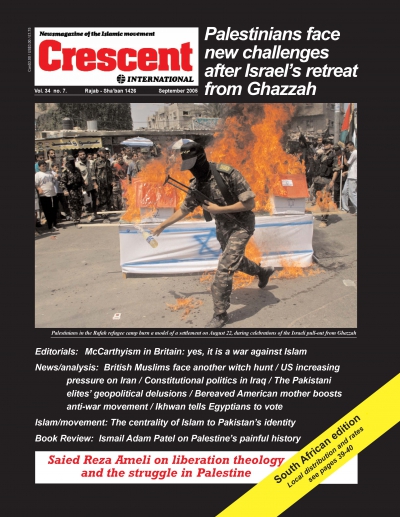Crescent International Vol. 34, No. 7
Newsmagazine of the Islamic movement
Iqbal Siddiqui
Rajab, 1426 2005-09


There has been an air of excitement in the Ummah since the presidential elections in the Islamic Republic of Iran. The older generation of Imam Khomeini’s friends and followers, this writer included, are uplifted by the fact that “one of us” – a Revolutionary – has become the president of an Islamic state that was, during the incumbency of the last two presidents, losing its Islamic character while promoting its nationalist and sectarian inclinations.

Palestine -- Beginner’s Guide by Ismail Adam Patel. Al-Aqsa Publishers, Leicester, 2005. Pp: 234, with more than 100 images and 50 maps. By Rajnaara Akhtar Ismail Adam Patel is a writer, speaker and activist on the question of Palestine, and has contributed to the debate since founding the Friends of Al-Aqsa organisation in 1997. His attachment to Palestine and Jerusalem stems from firsthand witness of the occupation and the resultant destruction of Palestinian society.

About fifteen years ago Muslims in Britain fought a long battle for the defence of Islam after the publication of Salman Rushdie’s blasphemous novel The Satanic Verses. In the two months since the bomb-blasts in London on July 7, it has become increasingly clear that Muslims in Britain face a similar battle now, as secular and liberal fundamentalists in Britain use the bombings as opportunity and justification for a much wider attack on the Muslim community in this country. Although it is entirely understandable that the British authorities should step up security precautions, and intensify investigations of those tiny and marginal groups among Muslims that espouse the sort of appalling violence that was seen on July 7, British politicians and many media and social commentators have turned the debate about the attacks of July 7 into a debate about Islam and Muslims in Britain and, in many cases, another full-scale offensive on Islam in this country.

When Israeli prime minister Ariel Sharon, long known as the Butcher of Beirut and famous as the champion of Israeli expansionism, first aired the idea of what he called a unilateral disengagement from Ghazzah, many observers were cynical, expecting that it was a ploy that would come to nothing. But there were always good strategic grounds for the decision, and many Palestinians must have drawn grim satisfaction from the sight last month of Israeli troops trying to force Jewish settlers to vacate their luxurious homes in Ghazzah’s zionist settlements. The first and foremost of these grounds was, of course, that the Palestinians of Ghazzah, led by Hamas, had simply made it impossibly difficult and expensive for the Israelis to remain there. But there are others too, which should not be forgotten.

In the 1980s, the Islamic movement was associated with progress and liberation in Muslim countries. Today, it is all too often associated with terrorism and violence. IQBAL SIDDIQUI discusses the reasons for this change and the need for voices of intelligent, moderate Islamic moderate leaders to reclaim the leadership of the Islamic movement...

In June, the Islamic Human Rights Committion convened a conference on liberation theology and the right to resist. Here we publish the keynote paper presented by DR SAIED REZA AMELI of the Institute for North American and European Studies, University of Tehran.

It must seem wrong to most Muslims for an Islamic movement, regardless of whether it is ‘moderate’ (as the Ikhwan al-Muslimeen is often described) or ‘extremist’, to approve of any election that is obviously designed to secure yet another term for a dictator.

That there is a serious disconnect between Islam and the West is not in doubt; what is hotly contested is whose fault it is. Each side blames the other but, given that the Western media dominate almost all discourse, Islam and Muslims are blamed for everything that goes wrong in the world.

On August 24 the British government announced details of new measures to be taken against foreign Muslims living in Britain. Foreign Muslims will be deported from Britain, or not permitted to enter the country in the first place, if they are considered by the government to be “fostering hatred or fomenting, or glorifying terrorist violence”.

Nothing illustrates the West’s hypocrisy better than its attitude to the issue of nuclear technology and its use for the generation of energy. There are several layers of hypocritical behaviour: countries that do not possess nuclear know-how must be denied its use because it is alleged that this would lead to their making nuclear weapons.

The peace deal signed last January for which the late John Garang fought for more than two decades secures for southern Sudan the right to secede, which it will exercise through a referendum to be held in six years’ time. There is little doubt that Garang would have insisted on the referendum being held, had he lived, and that the southerners will vote for secession because of their strong hostility towards the north and their backers’ keenness to have the “largest Muslim-dominated country in Africa” broken up.

By camping outside US president George Bush’s Crawford ranch and demanding to meet him, the mother of a slain American soldier has given a human face to the anti-war movement. She has also energized it in a way that had not seemed possible only a few weeks earlier.

Even the elaborate Independence Day celebrations on August 14 could not conceal the panic that has gripped Pakistan’s ruling elites since America’s military and nuclear agreements withIndia in June and July respectively.
